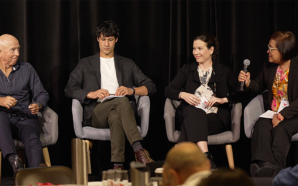Just as a plant needs the right conditions to bear fruit, so too do we need the right conditions for our faith to be nourished and grow so that we can discern effectively and be open to listening to the voice of God. Here are 10 practical steps you can take to discern effectively.
1. Don’t explore alone
In daily life we might be told to “stand on our own two feet” but in the Church we “encourage one another and build each other up” (1 Th 5:11). We don’t discern alone but in the communion of the Church which is Christ’s own body (Rom 12) which we became part of through baptism. Within the body of Christ we discern with the support of community, formation in our faith and the grace of the sacraments. Through the Church we are given the Holy Spirit which unites us, enlightens us and helps us to grow in our spiritual lives. Our spiritual lives are nourished by attending Mass, hearing the word of God, regularly encountering God’s mercy in Confession, being accompanied through a parish group, and being nourished through talks and retreats.
2. Listen
Faithful, daily prayer (no matter how you feel) is a must if you want to learn to recognise the voice of Jesus calling to you. If we cannot dedicate some time to the one who is the source of our life, we really need to question whether our priorities are in order. If you are not at the point of faithful, daily prayer don’t give up – we all have to start somewhere. Give God the chance to deepen your prayer life by going on a retreat, reading a book on prayer, asking a spiritual director to teach you how to pray more deeply, or dedicating time each day to prayer (start with just 15 minutes a day). A particularly good way to pray is to meditate upon scripture. Read more on prayer.
3. Find a Spiritual Director
St. Bernard of Clairvaux (1090-1153) once said words to the effect: a person who is his own spiritual director becomes the disciple of a fool! His point is that it can be very helpful to have an objective “sounding-board” in our spiritual life. A spiritual director is such a person: someone who accompanies you in your spiritual journey and helps you to understand how the Holy Spirit is acting in your life. Read more on ‘How Spiritual Direction Helps us Discern’. For help finding a spiritual director, visit our website or email vocations@parracatholic.org.
4. Cultivate the Right Dispositions (Attitudes)
In order to listen to God, we need to foster the right dispositions or attitudes. These include openness to what God has to say, humility (truth about who we are and who God is), a desire to please God, an attitude of surrender, an attitude of healthy ‘indifference’ (desiring only what God wants for us), a ‘detachment’ from things which prevent us from listening to God, vulnerability before God, and willingness to take up our cross and follow Jesus through both the joys and challenges of our vocation. A spiritual director can help us notice these attitudes.
5. Go on a retreat
Getting away from the busyness of daily life and immersing yourself in a quiet environment can help you listen to God. You can attend retreats which include talks, or a silent retreat; in either case you can also take the opportunity to receive spiritual direction. Find out more about retreats in the greater Sydney area. The Vocation Centre and various religious communities in Sydney also offer retreats which you will find listed on our events page.
6. Seek opportunities for Catechesis
Discovering your vocation requires putting your trust in God, but you can’t love and trust God if you don’t know Him. You can grow in understanding by reading a good book or article, exploring the excellent resources on The Well and Word on Fire, or undertake some further study. Visit the websites of these institutions for more information: Catholic Institute of Sydney, Australian Catholic University, Campion College and the University of Notre Dame.
7. Make contact with your Diocesan Vocational Director
Contact your Vocation Director and ask to have a confidential chat. This does not mean that the Vocation Director will push you into a convent or seminary! His first responsibility is to listen to what the Holy Spirit is doing in you. It is possible that the Holy Spirit may not be calling you to the priesthood or religious life. This is why we need to discern. To contact Fr Christopher del Rosario, click here.
8. Approach a religious community and make an enquiry
You could wonder what life would be like if you were to be a sister, brother or religious priest or nun, but taking a step to meet and spend some time with the community is going to be more helpful than speculating about whether they are right for you. Don’t be afraid of having a confidential chat with them. Click here for a list of religious communities.
9. Cultivate your freedom
In order to be able to make a choice, we also need to have freedom to say ‘Yes’ to God. God appeals to our freedom, and the more we are truly free, the more we can respond to God’s call. To say ‘yes’ like Mary did, we need to say ‘yes’ to following Jesus and his Church through the little demands of our daily lives. For example, praying every day, Sunday Mass, getting up on time, helping out at home, and being charitable to others, etc. These little acts of love prepare our hearts to say ‘yes’ completely to God when that love matures.
10. Dare to dream and live big!
Recently Pope Francis said “life is not grey, life is for betting on grand ideals and for great things!” Many of the saints were ambitious to do something beautiful and significant with their lives. Think of St Teresa of Calcutta, St Mary Mackillop and St John Paul II: they were anything but boring! These saints tapped into an incredible dream God had for them when he created them, and they committed everything to bringing that dream to life!
To learn more about vocations in the Diocese of Parramatta, please visit parracatholic.org/vocations
With thanks to the Vocation Centre in the Catholic Archdiocese of Sydney.








